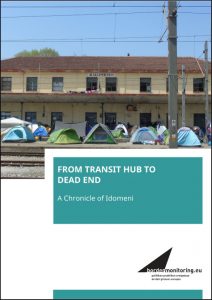DLF | 04.01.2018
Von Alexander Bühler
Trotz der Kälte hausen sie in Zelten, die hygienischen Bedingungen sind katastrophal und die Versorgung ist miserabel: Im Lager Moria auf der Insel Lesbos leben rund 5600 Flüchtlinge unter menschenunwürdigen Bedingungen – und die griechischen Behörden schauen tatenlos zu.
Wie jeden Sonntagmorgen marschiert eine Kapelle der griechischen Marine zum Hauptplatz des Städtchens Mytilini, um die griechische Fahne zu hissen. Eine patriotische Demonstration, denn die Insel Lesbos, auf der Mytilini liegt, ist nur ein paar Seemeilen von der Türkei entfernt. Dieser Sonntag ist jedoch anders. Am Hauptplatz lagern Flüchtlinge, demonstrierende Flüchtlinge.

